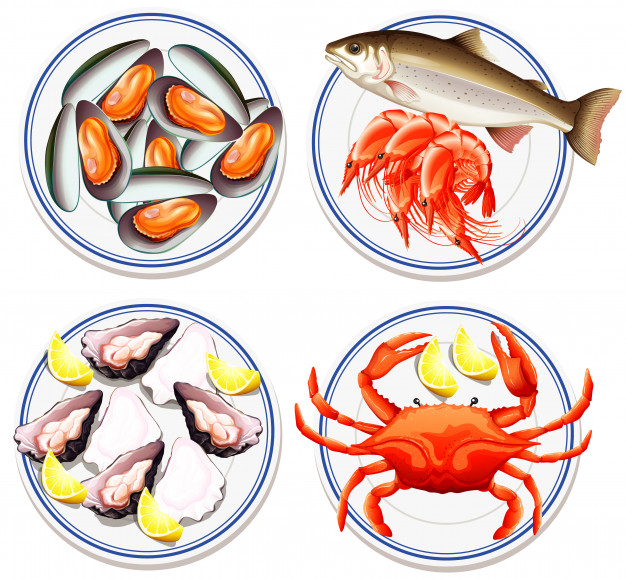Aquatic invertebrates, which have shell, are generally known as shellfish. It is rich in lean proteins, micronutrients and essential fats that offer numerous health benefits.
Type
Shellfish can be broadly divided into two classes, which include crustaceans and mollusks. Below points will discuss about these two types of shellfish –
Crustaceans:
- Crustaceans are those types of shellfish that are generally covered with a section of shell, which look like armor
- Crab, shrimp, lobster, crayfish are the example of crustaceans
Mollusks:
- These types of shell fish have two parts shell
- Clam, oyster, scallop are the most common example of shellfish
Characteristics
- It includes two extremely diversified phyla such as phylum Mollusca and phylum Arthropoda. These two groups are generally termed as shellfish
- Exoskeletons are present in Arthropodas, which are made up of chitin, whereas shells are present in Mollusca that are composed of calcium

Nutritional profile
Protein
- It is considered as one of the most important source of dietary proteins and especially rich in lean protein
- It contains several essential amino acids, which play various imperative functions in body. As body cannot synthesize essential amino acid, hence it should be consumed through diet and consumption of shell fish is a great option for fulfilling the need of essential amino acids
- Protein that presents in shellfish helps to promote the growth and development of muscular system of the body
- It also plays significant role in supporting normal cellular functions thus helps to enhance the overall health status

Fat
- Shellfish contains less amount of fats but the fat present in shellfish are considered as healthy fats
- It is basically rich in unsaturated fatty acids (mainly polyunsaturated fatty acid) whereas does not contain enough saturated fat
- It has seen that shellfish contains saturated and unsaturated fatty acid in a desirable proportion thus its consumption is very effective for maintaining a healthy lipid profile
- It is considered as one of the best source of omega-3-fatty acid, which acts as an effective preventive measure for cardiovascular disease. Omega-3-fatty acid of shell fish also offers numerous health benefits such as it helps to boost up the immunity of the body, it helps to reduce the susceptibility of carcinoma, it helps to decrease the prevalence of chronic inflammatory diseases as it has potent anti-inflammatory activities, it plays vital role in the brain development also and promotes the functionality of central and peripheral nervous system
- It contains dietary cholesterol too
- It has seen that consumption of shellfish is very beneficial for maintaining cholesterol level in blood and it also helps to keep a healthy ratio of HDL and LDL in body

Vitamins
- It contains several vitamins and especially rich in Vitamin A, Vitamin B3, Vitamin B6 and Vitamin B12
- Vitamin A of shellfish plays imperative role in promoting eye health. It has seen that consumption of shellfish is extremely helpful for reducing the prevalence of eye disorders like night blindness, macular degeneration, xerophthalmia, bitot’s spot etc. Vitamin A present in shellfish also acts as an important antioxidant that helps to protect the body (especially the eye) from the harm full consequences of free radicals
- Vitamin B3 and B6 help in metabolism by participating in various metabolic reactions in the form of coenzymes
- Vitamin B12 found in shellfish plays significant role in promoting the growth as well as functionality of red blood cells thus its consumption is considered to be very effective for reducing the prevalence of pernicious anemia. It also helps to suppress cancerous cell growth and plays imperative role in supporting the communication of nerve cells
Minerals
- It is packed with various important trace elements, which include calcium, phosphorus, magnesium, copper, zinc, iron and iodine
- Its consumption is very helpful for strengthening the skeletal system as it contains significant amount of calcium and phosphorus
- Its iron and copper content play imperative role in the synthesis of hemoglobin and also help to improve the health of blood vessels
- Iodine present in shellfish plays important role in the development of nervous system


Health benefits
Role on immunity
- It contains various nutrients, which act as potent immune booster thus its consumption is extremely helpful for improving the immunological responses of the body
- Zinc component of shellfish is considered as one of the most important nutrients that promotes health and functionality of immune cells in body
- It is closely related with enhancing the function of cell mediated non specific immunity
- It is better to include shellfish in regular diet for reducing the risk of developing chronic diseases as it helps to strengthen the defense mechanism of the body
Role on nervous system
- Consumption of shellfish is very beneficial for improving the functionality of central as well as peripheral nervous system
- Its omega-3-fatty acid content and Vitamin B12 content play significant role in enhancing brain activity
- Omega-3-fatty acid of shellfish helps to build cell membrane of brain cells and also helps to maintain the integrity of brain cell membrane
- Vitamin B12 present in shellfish plays significant role in preventing brain atrophy, which is characterized by losing of neurons in brain and it is also associated with preventing the prevalence of dementia or memory loss
- Its antioxidant and anti-inflammatory activities are responsible for protecting the brain cells from damages thus decreases the risk of developing neurological disorders
- It has seen that consumption of shellfish is also very useful for improving mood as it is associated with stimulating the synthesis of those biochemical substances, which have a positive impact on mood

Role on cardio vascular system
- Omega-3-fatty acid of shellfish is considered as the principal cardio protective component. It has potent anti-inflammatory activities that help to protect the heart from inflammatory damages and also delay the onset of inflammatory events thus helps to reduce the susceptibility of developing cardio vascular diseases
- Its unsaturated fatty acid content is also very beneficial for decreasing the prevalence of atherosclerosis and coronary artery disease
- Its consumption is extremely effective for promoting the synthesis of good cholesterol that is HDL in body, which plays important role in improving cardiac health and functionality
- It has seen that individuals who consume shellfish have lesser risk of developing heart attacks or strokes
Role on weight management
- Individual who want to reduce their body weight should include shellfish in their diet
- It is rich in healthy fats as well as lean protein, which play significant role in reducing body weight
- It has seen that consumption of protein rich food is extremely beneficial for making an individual feel full and satisfied, which ultimately helps to reduce food intake hence calorie consumption. As a result it prevents the development of positive energy balance thus helps in proper weight management
- Its omega-3-fatty acid also plays vital role in preventing obesity. It helps to increase the metabolic rate in many folds thus enhances calorie expenditure hence promotes weight loss. Whereas it is also associated with decreasing the concentration of cholesterol in body thus helps to reduce body fat percentage, especially visceral fat

Risk factors
- Shellfish contains tropomyosin, which is considered as an allergenic protein and it is responsible for developing severe allergic reaction in some individual
- It also contains heavy metals as well as contaminants

Source:
Bernstein, A.S., Oken, E. and de Ferranti, S., 2019. Fish, shellfish, and children’s health: an assessment of benefits, risks, and sustainability. Pediatrics, 143(6).
Domingo, J.L., 2016. Nutrients and chemical pollutants in fish and shellfish. Balancing health benefits and risks of regular fish consumption. Critical reviews in food science and nutrition, 56(6), pp.979-988.
DURMUŞ, M., 2018. Fish oil for human health: omega-3 fatty acid profiles of marine seafood species. Food Science and Technology, (AHEAD).
Nielsen, S.J., 2019. Omega 3 Fatty Acid Consumption from Seafood and Cognitive Functioning, 2011-2014 (P18-085-19). Current developments in nutrition, 3(Supplement_1), pp.nzz039-P18.
Venugopal, V. and Gopakumar, K., 2017. Shellfish: nutritive value, health benefits, and consumer safety. Comprehensive Reviews in Food Science and Food Safety, 16(6), pp.1219-1242.
Wright, A.C., Fan, Y. and Baker, G.L., 2018. Nutritional value and food safety of bivalve molluscan shellfish. Journal of Shellfish Research, 37(4), pp.695-708.
Xu, L., Cai, J., Gao, T. and Ma, A., 2021. Shellfish consumption and health: A comprehensive review of human studies and recommendations for enhanced public policy. Critical Reviews in Food Science and Nutrition, pp.1-13.









